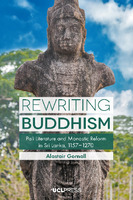Rewriting Buddhism
Pali Literature and Monastic Reform in Sri Lanka, 1157–1270
Abstract
Rewriting Buddhism is the first intellectual history of premodern Sri Lanka’s most culturally productive period. This era of reform (1157–1270) shaped the nature of Theravada Buddhism both in Sri Lanka and also Southeast Asia and even today continues to define monastic intellectual life in the region.
Alastair Gornall argues that the long century’s literary productivity was not born of political stability, as is often thought, but rather of the social, economic and political chaos brought about by invasions and civil wars. Faced with unprecedented uncertainty, the monastic community sought greater political autonomy, styled itself as royal court, and undertook a series of reforms, most notably, a purification and unification in 1165 during the reign of Parakramabahu I. He describes how central to the process of reform was the production of new forms of Pali literature, which helped create a new conceptual and social coherence within the reformed community; one that served to preserve and protect their religious tradition while also expanding its reach among the more fragmented and localized elites of the period.
Keywords
Buddhism; Theravada; Sri Lanka; Pali; South AsiaDOI
10.14324/111.9781787355156ISBN
9781787355156Publisher
UCL PressPublisher website
https://www.uclpress.co.uk/Publication date and place
London, 2020Classification
Asian history
Buddhism: sacred texts and revered writings


 Download
Download Web Shop
Web Shop